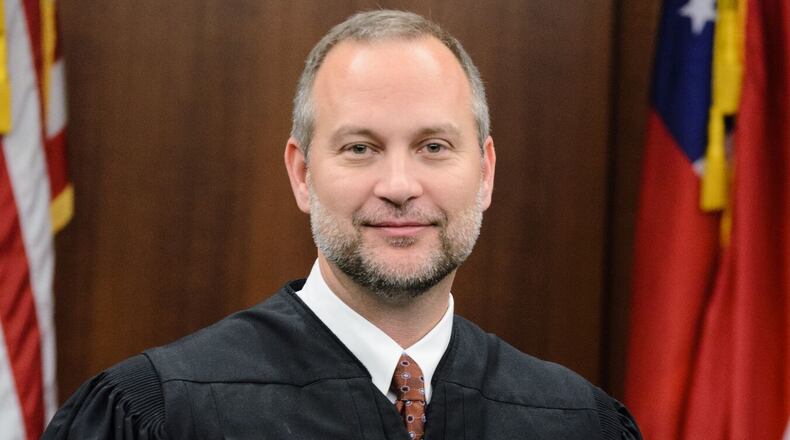A Cobb County judge has accused a high-profile lawyer of making false statements and engaging in unethical conduct in contentious litigation involving a secret sex tape of Waffle House chairman Joe Rogers.
In extraordinary orders issued late Friday, Superior Court Judge Robert Leonard removed himself from the case, but not before lashing out at Marietta lawyer David Cohen. Cohen, the judge wrote, had lodged misleading allegations about Leonard and had violated “his duty of candor to the court and his sworn oath.”
Atlanta lawyer John Floyd, who represents Cohen and his law partner, John Butters, said Monday that Leonard’s orders “demonstrate a lack of impartiality.”
Floyd said the lawyers deny any wrongdoing in filing the recusal motions. Their duty, he said, was to get a trial free of judicial prejudice. “Mr. Cohen has never before filed a motion to recuse a judge,” Floyd added.
In recent years, Cohen made a name for himself in a lawsuit against Cobb EMC over dividends that resulted in a $98 million settlement.
The case involving Rogers stems from a secret video recording his housekeeper, Mye Brindle, took while she performed a sex act on Rogers in his bedroom in 2012. She made the recording a few weeks after retaining Cohen and his law partner, Butters, according to court records.
After the video was taken, Cohen sent a letter to Rogers, encouraging him to reach a large monetary settlement to resolve Brindle’s allegations that he had sexually harassed her. Failing to do so could result in media attention, criminal charges and the destruction of families, the letter said.
Rogers has said he unwisely had consensual sex with Brindle but denied harassing her. He also filed one lawsuit against Brindle and another against Cohen and Butters. For more than four years, Leonard had presided over these two cases.
Last year, a Fulton County grand jury indicted Brindle, Cohen and Butters for conspiracy to commit extortion and illegal eavesdropping charges. Although a Fulton judge dismissed the case, the district attorney's office is appealing that decision.
In recent weeks, Brindle’s lawyer filed two separate motions, supported by sworn affidavits signed by Cohen. They contended Leonard should step down because he had been biased toward Rogers in his rulings and has numerous conflicts of interest.
One alleged conflict was that an ethics complaint had been filed against Leonard before the state’s Judicial Qualifications Commission. JQC Commissioner Richard Hyde works as an investigator for Rogers’ legal team in the sex tape case, the motion said, creating a question about whether Leonard would favor Rogers’ side in the litigation to curry favor with Hyde.
The motion said Leonard had presided over a case with attorney Katie Kiihnl, whom Leonard would later marry. Also, Leonard appointed Diane Woods, one of his divorce lawyers, as a guardian in a case before him, a motion said.
On Thursday, Leonard signed an order in which he declined to recuse himself from the Rogers case. On Friday, he changed his mind, based on yet another recusal motion that said a lawyer involved in the litigation once represented Kiihnl. This created enough of an appearance of conflict to require him to step down, Leonard said.
The judge said removing himself from the case enabled him to respond to the “many wild and salacious allegations that the court believes were designed to strategically place the court in the middle of a classic Morton’s Fork.” (A Morton’s Fork, named after 15th century Archbishop of Canterbury John Morton, forces one to choose between two paths that both lead to an undesirable destination.)
Previously, Leonard said, he had chosen to “stand tall, tolerate the false allegations against the court, its wife and other members of the legal community, and continue to preside over the case.” Recusal motions have “become a popular method for disgruntled litigants, like Cohen, to attack their assigned judge in an effort to judge-shop,” he said.
In his 10-page order, Leonard addressed each of Cohen’s numerous allegations, calling them either a “falsehood” or a “misleading statement.”
First, Leonard wrote, he is not under investigation by the state’s judicial disciplinary agency.
Judicial Qualifications Commission director Ben Easterlin confirmed that “there is no pending complaint against Judge Leonard and no investigation pending against Judge Leonard.”
As for his wife appearing in cases before him, Leonard accused Cohen of “cherry-picking” from the court record to make it appear unethical. “Despite Cohen’s attempts to mislead the court and the public, neither this court’s wife, nor any member of her firm, ever made any appearance in front of this court after its relationship began with her,” Leonard wrote.
As for Woods, his former divorce lawyer, Leonard said when he appointed her as a guardian in a case he disclosed his relationship with her in open court, and both parties agreed to Woods’ involvement. “There was no wrongdoing here despite what Cohen claims,” Leonard wrote.
Rogers’ lawyer, Robert Ingram, said Leonard should not have been subjected to such attacks.
“Judge Leonard has bent over backwards to be fair to everybody in this case,” Ingram said. “This is the kind of behavior lawyers shouldn’t be engaged in.”
As for Leonard’s final order, Ingram said, “You could tell he had some pent-up frustration.”
About the Author
The Latest
Featured





